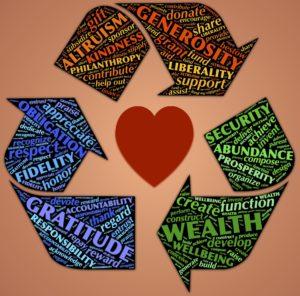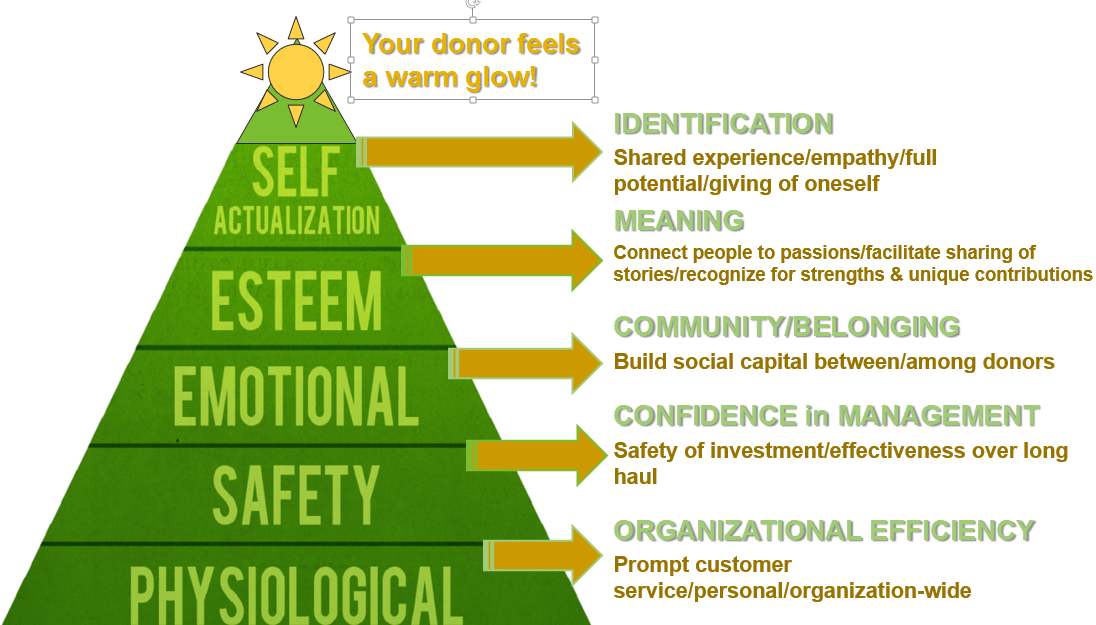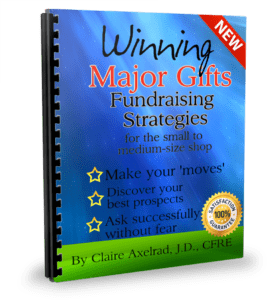 I find a widespread misunderstanding about the notion of what constitutes being donor-centered. It derives from two misconceptions:
I find a widespread misunderstanding about the notion of what constitutes being donor-centered. It derives from two misconceptions:
- Assuming people don’t want to be asked.
- Spending all your time on cultivation, assuming folks don’t need an ask and will simply give spontaneously as a result of being wooed.
Both of these rationales short-change your would-be donors.
Why?
FIRST: Donors want to be asked because they’re starved for the love that comes from voluntary giving and receiving. Donors have love to give, but don’t always have an object towards which to direct their affection.
SECOND: Donors need to be asked because when they’re not, they don’t know how much you need their help. Consequently, giving feels a bit empty. Almost a bit like a crap shoot. Donors want to invest their money where they feel confident it will be most appreciated and will do the most good.
Let’s delve into both of these misconceptions more deeply, putting them into a donor-centered context.
In other words, what are your would-be donors feeling?
Donors are Love-Starved
Think about the people you know. Think about yourself.
What are you, and all these people, doing with the gift of life?
Sure, everyone is busy, busy, busy.
But is all that busy-ness making folks happy?
Are people stopping to really think about what makes their lives meaningful?
Sometimes, yes.
Often, not so much.
People really do want to be asked to share some love.
Remember: ‘Philanthropy’ translated from the Greek means ‘love of humanity.‘
Your job is to be a facilitator of this love.
People, for the most part, truly want to be helpful.
So think of your job, as a philanthropy facilitator thusly:
You must become the object of your would-be donor’s affection.
Their much-yearned-for love recipient.
A way for people to enact their values in a meaningful way, and to receiving ongoing feedback about how much their expression of love makes a positive impact.
Sure, donors may have other loves in their lives. Their families. Their jobs. Their friends. Their hobbies. Even other charities.
But it’s not for you to decide that’s all they want or need.
In fact, if you’re familiar with Maslow’s Hierarchy of Needs you know people have varied needs over different phases in their lives. Needs for community, belonging, self-actualization and other kinds of purpose that bring people joy.
The joy from philanthropic giving is special, and merits encouragement.
Giving brings a warm glow of satisfaction, akin to eating chocolate.
MRI studies show when people merely contemplate giving it lights up the pleasure centers in their brains.
You’d probably agree that bringing a donor a gift of chocolate (unless they’re allergic or diabetic) is a donor-centered gesture, right?
Then why isn’t asking also a donor-centric act?
It’s not donor-centered to deprive would-be donors of their warm glow opportunity.
It’s donor-centered’ to give the opportunity to love and be loved.
And in so doing, you’ll find your needs are met as well.
As it is variously said: “Give and you shall receive.”
This should be the mantra of all fundraising. Especially major gift fundraising.
Donors are Meaning-Starved
When you ask you’re not taking, you’re giving.
And what you’re giving is opportunity.
The value of that opportunity will vary from donor to donor. And it will mean different things at different points in each person’s life.
The more you listen to donors, and endeavor to learn what floats their particular boat, the better you can tailor your ask to elicit a response that will give your donor the biggest value payoff possible.
Truly donor-centered fundraising takes into account your donor’s needs.
And in so doing, you’ll find your needs are met as well.
As it is variously said: “Ask and it shall be given you.”
Again, this should be the mantra of all fundraising. Especially major gift fundraising.
Consider your donor’s ‘Hierarchy of Needs.’

In your donor’s journey towards feeling really joyful about their engagement and investment with you – be it awareness building, cultivation, solicitation or ongoing stewardship – consider your donor’s perspective at that point in time. What do they need/want to hear from you?
At some point, to get them to that ‘warm glow,’ you’re going to have to make a direct ask – the more targeted and personal, the better.
Don’t say “No” on others’ behalf.
Stop making excuses for not asking.
I often hear staff or board say things like:
- “Now’s not a good time to ask, as she’s going through chemo.”
- “Now’s not a good time to ask, as he just became a widower.”
- “Now’s not a good time to ask, because she just lost her job.”
- “Now’s not a good time to ask, as they’ve got two kids in college.”
- “Now’s not a good time to ask, as he just got home from the hospital.”
Goodness, how presumptuous!
Do you treat donors like they can’t think for themselves?
People are perfectly capable of saying “no” on their own behalf.
And you can’t assume anything. You know what they say about the word “assume,” right?
Someone who is going through a tough time, for whatever reason, might welcome the opportunity to bring something good into their life! They might enjoy the personal interaction that comes from being asked to give. In fact, this might be precisely the time they most need to become involved in something larger than themselves.
If not, they’ll tell you.
Don’t deny donors their opportunities to bring love and meaning into their lives.
Giving brings meaning and fulfillment on a high level.
It’s something for which our brains are hard-wired.
So stop considering your own needs and consider your donor’s.
I don’t care if you’re afraid to ask. Get. Over. It! If you don’t, you’ll never succeed in this business. Not for your organization, not for yourself, and most certainly not for your donors.
It’s simply not okay to wash your hands of the need to ask.
It’s like buying up a bunch of merchandise people are clamoring to buy, stocking your store with the stuff, sending out flyers announcing you’ve got the goods, watching as people line up to see, touch, taste or otherwise sense your wares, and then… never opening the doors for your sale so folks can actually satisfy their cravings.
Philanthropic Giving Makes People Happy!
Daniel Pink, author of the wonderful book To Sell Is Human, argues we’re all in sales today.
And ‘selling’ is not a bad thing. Not at all. Not when you have something people want to buy!
Think of your nonprofit as a store where people shop for love and meaning.
Within your social benefit store you’ve:
- Created programs that offer meaningful solutions to relevant problems.
- Populated your website with information describing these value-laden, life-alterating initiatives.
- Developed marketing messages driving people to your website, social media, events and so forth.
- Managed to interest and excite and even engage people with your cause.
But then… you never quite get around to making a direct, specific ask to invest in the change would-be donors want to see. And want to become an integral part of.
You may somehow think you’re saving people money by not asking to “take” something away from them. It’s a subconscious bias we have when it comes to the topic of money — still one of the biggest taboos in our society.
But never, ever forget that philanthropy (i.e., “love of humanity”) is about love, not money.
Philanthropy is a voluntary, value-for-value exchange.
If you don’t make it easy for people to exercise their choice to spend their money in ways that bring them joy and satisfaction, you’re not being caring.
You’re kind of being mean.
I’ll often ask board members if they love the charity on whose board they serve. Of course they say “yes!”
Then I’ll ask them why they’re being so stingy with that which they love. Why aren’t they sharing the love?
This really flips the equation for most folks, helping them understand the values their nonprofit enacts and how these values may align significantly with those of their would-be donors.
That’s how you want to approach major gift fundraising.
Come from a place of love and values, not from a place of need and money.
When people join together to share love and enact their values, it’s amazing what wonders may ensue.
Want to Learn More about Sharing the Love and Asking for Major Gifts?

Remember: 88% of dollars raised comes from just 12% of donors. You need a plan to focus on your 12%.
You’ve still got time to grab the Early Bird Discount for my popular Winning Major Gifts Fundraising Strategies e-course. It’s meant for organizations of all shapes and sizes — because I firmly believe just about every nonprofit should have a major gifts program. If you don’t, you’re probably working harder than you need to and also raising less than you could. So make 2020 the year you resolve to prioritize major gift fundraising!
Please, if you have any questions about this course feel free to ask me. I’m just an email away at claire@clairification.com.
NOTE: I’m limiting slots so I can reasonably respond to participant emails — and you do have email access to me for the duration of the 8-week course. Spots are filling up. So don’t miss out if this is something from which you and your team can benefit (enroll up to 5 additional team members for no additional cost). I guarantee you’ll find it to be a high-value course that will return way more than the amount you invest. You can get a 100% refund if you’re not happy after 2 weeks — but I’ve honestly never had that happen. [My price is less than half the price you’ll find elsewhere for similar content — and that’s for just one person, not a full team. Next year the model changes and the price goes up. So avail yourself of this bargain while you can.]
Get your major gift groove on: Be with Claire or be Square. (Groan…)
Related post: Are You Reading Your Major Donors Correctly?
Image courtesy of John Hain from Pixabay






Good morning Claire,
Your content is always EXCELLENT — so worthy of embracing and enacting. I especially appreciate your link to the full Maslow treatise; including the Hierarchy of Needs “triangle” that, at the top, notes: “Your donor feels a warm glow!”
I hope our nonprofits — which are absolutely vital to the quality of life in our communities — seek and find many a warm glow from an ever-broadening band of donors in 2020 and beyond.
THANK YOU! for the super important advisory role you play in making that happen. Happy New Year!